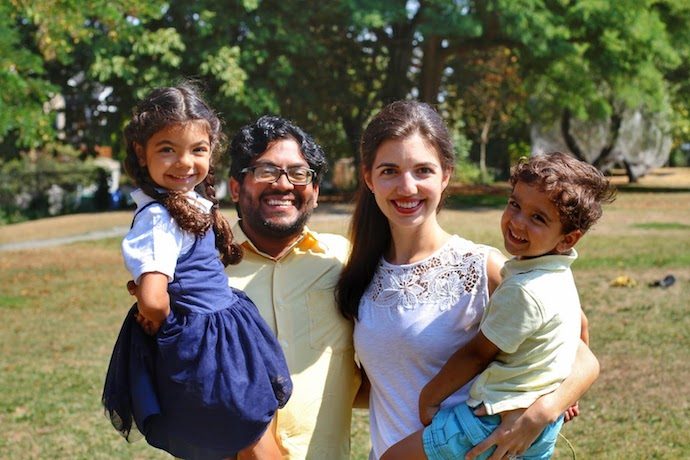On Tuesday, the special election in Arizona’s eighth congressional district could produce the fifth Hindu member of the U.S. House. While Democrat Hiral Tipirneni faces long odds—despite polls showing otherwise—in a reliably red district formerly held by GOP Rep. Trent Franks (who had issues with moral hypocrisy), her run highlights a key constituency Democrats need to win back the House: Hindus.
Nearly two years after the saturation of media coverage on the “Republican Hindu Coalition” and the Trump campaign’s outreach to Hindus, Hindu Americans are flexing their political muscle—as progressive Democrats. Reflecting the partisan breakdown of Hindu Americans, there could be as many as eight Hindus—all Democrats—in Congress come January. Four upstarts are vying to join current Hindu members Tulsi Gabbard, Raja Krishnamoorthi, Pramila Jayapal and Ro Khanna.
To see how Hindus could be a major part a potential blue wave, look no further than New Jersey’s 7th congressional district, where longtime Republican Rep. Leonard Lance is in serious danger. One of his most outspoken Democratic challengers is Goutam Jois, a Hindu American attorney, social justice advocate, and former Youth Governor of New Jersey. Jois was recently endorsed by the Hindu American Political Action Committee.
Jois has worked to mobilize voters of color, long ignored by the party establishment, in his Democratic primary bid and the general election. Key to his outreach has been the large South Asian population in the district, which includes Hindus from India and the West Indies, Sikhs, and Muslims. Jois believes Democrats are ignoring Hindus and other religious minority groups at their own peril.
“We all understand that politics works best when everyone’s voice is heard in the process. Yet for far too long, some of the largest-growing groups in New Jersey have been on the sidelines in politics,” he said. “That’s why our campaign is doing unprecedented outreach to underrepresented groups, including millennials and ethnic communities.”
Jois is also running against the Democratic establishment, which backed a decades-long Washington insider, Tom Malinowski in the crowded Democratic Party. Jois views the narrative of Malinowski’s establishment-backed inevitability as particularly destructive for Democrats.
“We’ve seen this movie before in 2016. We can’t simply assume we’re going to win; we need to engage with voters in every corner of the district. That’s why we’re using creative strategies, like registering new voters outside of a screening for the movie Black Panther.”
Jois isn’t the only one with strong odds to win in November. Hindu Americans Aruna Miller and Sri Kulkarni are also earning national praise for their campaigns in Maryland and Texas, respectively, with Miller now being targeted by Republicans in a smear campaign. As former RNC chair Michael Steele noted to the Washington Post, “she’s perceived as a strong potential candidate.”
Hindu Americans have long been aligned with the Democratic party, but in recent years, the GOP has aggressively courted them as voters, donors, and even candidates. According to various studies, roughly two-thirds of Hindus are Democrats or Democrat-leaning. Despite the rhetoric behind 2016, most Hindus have stayed reliably Democratic.
Rishi Bhutada, treasurer of the Hindu American Political Action Committee, said that Hindus have traditionally been drawn to the Democratic Party because they have viewed it as more inclusive.
“They perceive Democratic Party to be more open to a multitude of faiths, and on certain domestic policy issues, the party matches up with more of what they believe in,” he said.
According to Padma Kuppa, a progressive activist and Hindu who is running for state representative in Michigan, Democratic values are in general alignment with what the Hindu American community prioritizes, namely “support of education, care for the environment, and fairness.”
“It’s about moving forward, making progress, not simply moving to the left or right,” said Kuppa, whose win in November could help flip the Michigan House to Democratic control.
For Hindu Americans like Jois, shoring up support among voters who have been on the sidelines while simultaneously taking on the party’s establishment is essentially double the work. But if he wins his primary, it’s likely going to be worth it come November.
“If the party establishment anoints the same type of candidates with the same consultants with the same message as it always has in this district, we know the result: we’ll lose,” he said. “Democrats haven’t held this seat since before I was born. We need to engage new voters and bring people off the sidelines because it’s the right thing to do—but also because the only way we can win in November is by changing the math. And that’s what our campaign is going to do.”
Bhutada sees the efforts of candidates like Jois—and the continued success of incumbents like Gabbard, Krishnamoorthi, Jayapal, and Khanna—as just “the tip of the iceberg.”
“The community is going to get more engaged as more Hindus run for office,” he said. “It’s not just donating money, but volunteering, registering to vote, and running for local offices. It’ll impact the primary and general elections”





